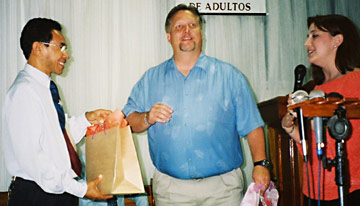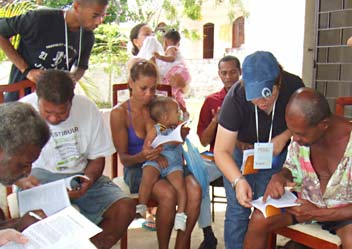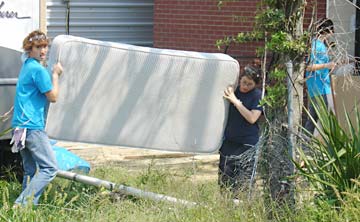Posted: 10/27/06
BGCT reorganized but not downsized
By Ken Camp
Managing Editor
DALLAS—Two years into a major restructuring of the Baptist Building, a focus on streamlined response to churches has not resulted in the significantly downsized organization some outside observers had anticipated.
Senior administrators point to a Baptist General Convention of Texas Executive Board staff who stay in closer contact with churches, respond more rapidly to congregations’ needs, demonstrate greater ethnic diversity—and are slightly larger in number.
According to figures provided by the Baptist Building, BGCT Executive Board staff totaled 281 in 2004 and 284 in 2006, with eight positions open. Those totals do not include Baptist Student Ministry directors, Texas Baptist Men, Woman’s Missionary Union of Texas, Baptist Church Loan Corporation and WorldconneX staff.
Collegiate Ministry employs 67 full-time Baptist Student Ministries directors who are paid exclusively by the BGCT—a number that has remained constant at least the last six years. Total workers currently number 123, including part-time staff, interns and campus missionaries whose salaries are paid in part by associations or other groups.
With 10 congregational strategists—nine full-time and one part-time—in place around the state, the Baptist Building is able to evaluate effectiveness in ways not possible previously, Executive Director Charles Wade said.
“Our congregational strategists are giving feedback about what difference we’re making in local churches,” Wade said. “We’re able to evaluate what we’re doing—not just in terms of how many people show up for a conference, but by checking back later to see what difference we’ve made in churches.”
Chief Operating Officer Ron Gunter noted pastors and associational directors of missions generally have responded positively to the field staff—congregational strategists and seven church starters.
The strategists and church starters work in cooperation with affinity-group leaders for African-American, Hispanic, intercultural, Western-heritage, and bivocational or small-membership churches, he noted.
Gunter also pointed to staff in the BGCT Service Center—seven employees who receive calls for help, information or resources and seven who generate phone contacts with churches—as working closely with the congregational strategists to make sure churches find the help they need.
At the same time, the new research and development office has made strides toward creating new processes to improve effectiveness and ensure accountability, he noted, pointing particularly to the modified zero-based budgeting method implemented this year.
The Baptist Building also has updated its computer systems, implemented church relationship management software and worked toward consolidating and integrating databases previously maintained by individual offices, he added.
“We’re sharing information across the organization. The research and development team manages that information for us and keeps data current and up-to-date,” Gunter said.
Baptist Building leaders acknowledged better understanding of churches’ needs does not automatically translate into improved delivery of services. Increasing the flow of information from churches to the BGCT Executive Board staff can create heightened expectations—and frustration unless the delivery of services to churches keeps pace.
While the staff reorganization has been completed for now, additional changes may take place as new needs are discovered. “I expect to see that we will have a need for more church starters,” Gunter noted.
Staff additions in some areas—such as the Service Center and the congregational strategists—have been offset to some degree by the elimination of a few positions and the consolidation of some functions.
• Areas eliminated. The prayer and spiritual development office, ChurchLife Resources (a church health assessment tool and website to help churches find resources) and the City Core Initiative (an urban missions project) were among the areas eliminated. Many of the staff assignments previously performed by missional church strategy and community ministries directors will be divided among other staff within the missions, evangelism and ministry area in the coming year.
• Events cancelled. A few events—such as the Epicenter missions conference and the Urban Training Institute—and initiatives like the ChurchLife Plus long-range planning consultations, church health and growth conferences, workshops on preserving church history and a regional church music conference in West Texas also either have been cancelled or will be reformatted.
• Programs dropped. Other programs, like the semester-church pilot project—an effort to plant short-term “seed churches” among students on college campuses—simply never got off the ground.
No “Add LIFE” programs to use Sunday school as a platform for church growth and evangelistic outreach will be started in 2007, but the process will continue in churches that already are involved.
• Names changed. Some longtime BGCT ministries have been renamed to reflect expanded focus. For instance, River Ministry now is called Border/Mexico Missions be-cause it includes missions in the interior of Mexico as well as the region along the Rio Grande.
The Texas Baptist Leadership Center became the congregational leadership team, and it was elevated in the organizational structure so its director reports to the chief operating officer.
• New initiatives started. Other new ministries have been launched, such as the Baptist Immigration Services Network.
Collegiate Ministries started the Collegiate Church Life Network to help churches develop ministries to college students and Abide, a 24-hour prayer retreat for college students.
The congregational leadership area has developed new assessment tools to help ministers recognize their strengths and identify areas where they need improvement, as well as categorize their leadership styles and adapt them to the places where they serve.
• Business as usual. The vast number of BGCT-related programs and events—such as Texas Partnerships, the LifeCall volunteer missions program, Hispanic Evangelism Confer-ence, Youth Evangelism Conference, the Congreso event for Hispanic young adults, the Focus conference for college students, the Restorative Justice Ministry Network, Singing Men of Texas and All-State Choir—continue relatively unchanged.
“Since we have discontinued relatively little, this has required the organization to squeeze the most strategic effectiveness out of every dollar,” Communications Director Ferrell Foster noted.
In the near future, the BGCT Executive Board staff plans to launch regional meetings that may replace some statewide events, Wade noted. “We are learning from the example of Texas WMU,” he said. Texas WMU replaced its annual Texas Leadership Conference with 13 regional Awakening events that drew about 3,400 participants—about four times the number who attended the statewide event at Waco in recent years.
Everything in the organizational structure and every initiative involving staff will be subject to continuing review and evaluation, Wade added. “We will be evaluating everything we do,” he said. “If we find out we are doing things that are not needed any more, we will move resources to areas where we need more people.”
News of religion, faith, missions, Bible study and Christian ministry among Texas Baptist churches, in the BGCT, the Southern Baptist Convention ( SBC ) and around the world.







